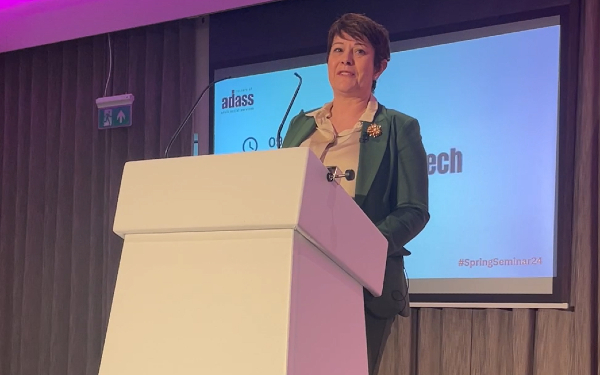
The “dire state of social care” is among the reasons that the NHS is in a “critical condition”, a government adviser has warned, in a report designed to provide a blueprint for a 10-year plan for the health service.
In a damning report commissioned by health and social care secretary Wes Streeting, Lord (Ara) Darzi said “austerity and a starvation of investment” during the 2010s, “confusion” and “fragmentation” caused by the 2012 reorganisation of the service and Covid had left the NHS in a state of “disrepair”.
Darzi – a surgeon and former Labour minister who is now politically unaffiliated – said “far too many people are waiting for too long and in too many clinical areas, quality of care has gone backwards”.
Hospitals consuming more of NHS budget
Despite successive governments vowing to shift care out of hospitals into the community, the reverse had happened, with the share of NHS budgets going on hospital care rising from 47% to 58% from 2006-22.
Too many people ended up in hospital because of significant underinvestment in community health services, while there had been a slowdown in patient flow through hospitals because of falling productivity.
In addition, 13% of hospital beds were taken up by people who were fit for discharge but were waiting for social care or other services to be put in place.
Social care in ‘dire state’
Though social care was outside Darzi’s investigation into the problems facing the NHS, he said it was “impossible to understand what has been happening in the NHS without
understanding what has happened to social care”, which he said was in a “dire state”.
Real-terms spending by councils on adult social care was only marginally higher in 2019-20 than 2010-11, after taking account of inflation, due to government cuts to local authority budgets.
“The result is that publicly funded social care is provided for fewer and fewer people while the demand for it has risen, largely as the result of an ageing population,” said Darzi.
Reductions in social care leaving people ‘stuck in acute wards’
According to official figures, the number of people who received long-term care fell from 872,520 in 2015-16 to 817,815 in 2021-22, though this figure subsequently rose to 835,335 in 2022-23.
“The impact on the NHS has been more people staying in hospital for longer than their medical needs require them to be there,” Darzi added.
“This means older people have been stuck in acute hospital wards rather than in facilities better suited to their needs.”
Call to rebalance NHS towards community
Darzi did not make any recommendations regarding social care – in line with his remit – but, among his recommendations, was rebalancing NHS finances to shift care out of hospitals into the community.
“General practice, mental health and community services will need to expand and adapt to the needs of those with long-term conditions whose prevalence is growing rapidly as the population age.
“Financial flows must lock-in this change irreversibly or it will not happen.”
This should be underpinned by a “neighbourhood NHS”, consisting of “new multidisciplinary models of care that bring together primary, community and mental health services”.
10-year plan for NHS
Keir Starmer has already outlined shifting care out of hospitals as one of Labour’s chief ambitions for the health service, along with investing in prevention and technology.
In a speech responding to the Darzi report on Thursday (12 September), the prime minister fleshed out Labour’s plan for a 10-year strategy for the NHS.
On shifting care out of hospital, he said: “That means more tests, scans, healthcare offered on high streets and town centres, improved GP access, bringing back the family doctor, offering digital consultations for those who want them.
“And more patients can be safely looked after in their own homes, where we can deal with problems early before people are off work sick and before they need to go to hospital.
And we’ve got to make good on the integration of health and social care, so we can discharge those 28 hospitals worth of patients, saving money, reducing the strain on our NHS and giving people better treatment.”
Social care ‘must be at heart of NHS reform’
In response to the Darzi review, the Association of Directors of Adult Social Services said social care needed to be a core part of NHS reform.

Melanie Williams, ADASS president, 2024-25
“We support Lord Darzi’s recommendation to shift focus and funding from hospitals, towards community and mental health services,” said ADASS president Melanie Williams.
“But social care must be at the heart of any plans to create a ‘neighbourhood NHS’, otherwise we’re at risk of failing to deliver this once-in-a-generation opportunity to transform health and social care.
“A strong, well-funded social care system is key to keeping people independent at home, healthy and out of hospital.”
‘Report shows need for home care investment’
The Homecare Association, which represents domiciliary care providers, said the report illustrated the need to invest in the sector.
“Home care plays a key role in preventing hospital admissions and readmissions, and reducing delayed discharges,” said chief executive Jane Townson.
“With 13% of hospital beds occupied by people waiting for social care, it’s clear that investing in our sector can contribute directly to reducing waiting lists for NHS treatment.”
Criticism of exclusion of NHS from Darzi remit
The Independent Care Group, which represents private and voluntary sector care providers, welcomed Darzi’s acknowledgement of the “crisis in social care”, but heavily criticised the fact that this was not included in his remit.
“That is a serious omission and makes something of a nonsense of the whole process,” said its chair, Mike Padgham.
“Wes Streeting has identified cutting waiting lists as his top priority and includes more care in the community and more preventative care, as levers towards achieving that.
“That means tackling the crisis in social care so that it can provide that community care and that preventative care, keep people out of hospital and help cut waiting lists.”



 Bournemouth, Christchurch and Poole
Bournemouth, Christchurch and Poole  Hampshire County Council
Hampshire County Council  Lincolnshire County Council
Lincolnshire County Council  Norfolk County Council
Norfolk County Council  Northamptonshire Children’s Trust
Northamptonshire Children’s Trust  South Gloucestershire Council
South Gloucestershire Council  Wiltshire Council
Wiltshire Council  Wokingham Borough Council
Wokingham Borough Council  Children and young people with SEND are ‘valued and prioritised’ in Wiltshire, find inspectors
Children and young people with SEND are ‘valued and prioritised’ in Wiltshire, find inspectors  How specialist refugee teams benefit young people and social workers
How specialist refugee teams benefit young people and social workers  Podcast: returning to social work after becoming a first-time parent
Podcast: returning to social work after becoming a first-time parent  Podcast: would you work for an inadequate-rated service?
Podcast: would you work for an inadequate-rated service?  Family help: one local authority’s experience of the model
Family help: one local authority’s experience of the model  Workforce Insights – showcasing a selection of the sector’s top recruiters
Workforce Insights – showcasing a selection of the sector’s top recruiters 

 Facebook
Facebook X
X LinkedIn
LinkedIn Instagram
Instagram
Doh!
And, the HofC Health Committee Inquiry into Commissioning of 2010 said what?
The Darzi Centres failed too!
Shifting the Burden through the manipulation of patient flow, re-engineering pathways and statistical analytics may offer some relief, and appease the please the various professional and organisational interests for a time, and as long as the lists and queues are for their services, and patients divvied up in their favour.
Lord Darzi knows that it’s also the economic syndication of such heavily invested interests that have added to the gaps and failures. And, let’s face it when the equity investment trusts have kept a cool £4tn in dry powder who’s gonna ignore them.
The relationship between the NHS and LocGov is premised upon these words ” the services of one public authority are to be treated as if those provided by the other authority” It’s meant to be duck-rabbit arrangement ~ the separation (and selling) off of either is a foundational breach of the Universal Services Obligation. The utilitarianism expected of universal services is based on having a sense of equivalence and balance between often opposed perspectives ie a consensus.
There isn’t one.
Repeating the findings and words from past failures (see Prof Ham on Intractability) will not restore the existence of a duck-rabbit relationship it will be an either/or.
The pain and anxiety management of the separation will metaphorically and, at patient level, literally be all that’s left for the duck-rabbit!
Fixes That Fail, Addiction (Out of Control) and Shifting The Burden are, now, self evident systems archetypes and all that is the remaining is a Tragedy of the Commons.
Poor Law Britain, Eh!
The imbalance in funding between Hospitals and community health (Health Visitors, District Nurses, etc) and social care services needs to be addressed. Hospitals become self-perpetuating entities, responding to emergencies and requiring ever more funding to do so when there is inadequate investment in the services which would prevent those emergencies arising in the first place. Some degree of redistribution of resources is in order.
The adage “services by one public authority are to be treated as those of the other” are the binding words of the, then, s25s Agreements and now the s75 Agreements ~ competitive rivalry amongst Primary and Tertiary Care making the actual cash transfers almost impossible to navigate.
The transparency needed by Councils to understand the impact of the ‘contract carve-uos’ (as they’re called) is missing completely and much is agreed including de-commissioning ‘offline’ and almost in secret between the LMC’s and their health partners.
Councils, as a whole, retaining the responsibility for scrutiny only ~ direct provision obligations has been whittled away through the manipulation of secondary legislation which has more recently been inserted into the face of primary legs across all vulnerable groups services.
Giving notice of significant changes itself is now more about being seen to have ratherthan actually having done so. If Councils are to reestablish themselves as the go to direct services provision then Elected Members most demonstrate that they are actually a ‘local authority’.
Remove healthcare from the budget of local authorities as that’s where it’s gone wrong as it’s been completely mismanaged! Councils should stick to sorting out education, housing & social care…or transfer social care to central government and place it within the health budget so as to tackle the bed blocking crisis.
Social Work is the poor relation in all of this, get them out of hospital at all costs is the cry from health.
Processing people like we work in a factory.
Not allowed to do our job as we are micromanaged to the hilt .
Health hold the power and they always will .
A huge factor is the shortage of Care Assistants due to the lack of pay . A lot of the time the funding is available from the LA’s but no resources. We need to professionalise the role .
Anybody still remembers “Darzi Centers” and “,Polyclinivs”? He argued for these and some were set up at great cost with next to negligible improvements and subsequently ditched. This is a revisit of his failed recommendations of those with social care plugged on to pretend he’s recommending something different. He isn’t. None privatisation less regulation. Not even disguised now because Sreeting is a fan of privatised and eventually private insurance based health care. Remember the past and you’ll not be fooled by solipsism.
As qualified social worker, 2002,I reflected on need for NHS and social to work together to support each other,in preventing people failing in one area ,and needed other.for want of social care they needed health or verse vicer.
How the word changed.mmmm
A health bureaucrat advising other health bureaucrats while the Health Secretary uses the noble Lord as his cover to dismantle the NHS. In the name of “fixing it” of course. It’s worth repeating what most have already said, this is a ruse to justify private insurance funded health services. Streeting is moving away from a National Health service to regional insurance funded ones. It’s plain in his response to Darzi and it’s plain from his previous recommendations that Darzi also believes a National Health service is past it’s usefulness too. Hence weasel utterances like
‘innovation’, ‘better use of technology’, managers given more autonomy to ‘develop’ local services. This is not the exhaustive list of course. Lansley destroyed Primary Health Care, Streeting will do the same with Hospital services while pushing for greater numbers of non-doctor personell to treat primary care patients rather than GPs being the first line for treatment and referral. The reason Streeting is hedging his bets on social care is because he knows he can’t drive full insurance based funding until his hedge fund provided advisors come up with a “phased in” reform acceptable to private providers. Too high premiums and take up will not meet thresholds, too low premiums and profit and dividends will be deemed “uneconomical” by providers. A bit like when they bleat on about the national living wage being “unaffordable”. Let’s see when Streeting will start telling us how he has to deal with “realities” rather than be driven by “ideology”.
One of the problems is that ward staff do not refer early enough for a SW assessment. recent experience was a blind gentleman was returned home, the ward assumed that because he was in a sheltered housing complex he would automatically have carers. Despite him and friends advising that he needed help with personal care, domestic tasks and meal preparation was sent home but readmitted within a week. He is likely to be an in patient for 2 weeks. Had ward referred him t o the Hospital Discharge Team for assessment of needs, a second admission may have been avoided.